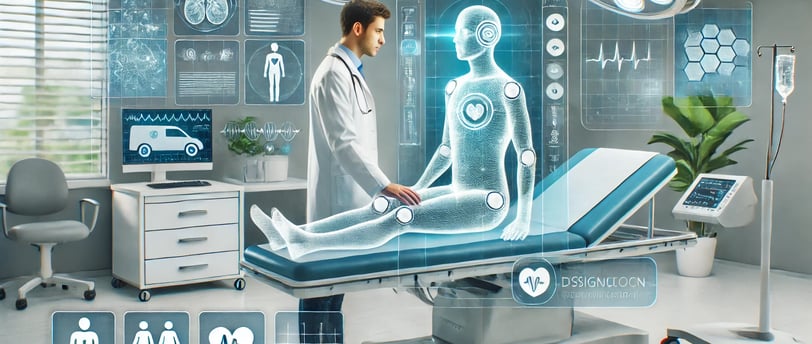The Future of AI in Healthcare: Revolutionizing Patient Care
Discover how AI is transforming healthcare with advanced diagnostics, personalized treatments, and efficient patient care. Learn about the benefits and challenges of integrating AI into medical practice.
WHERE AI MEETS BIOLOGY
6/27/20243 min read


Today, let's explore a fascinating subject that's transforming our world: the impact of artificial intelligence (AI) on healthcare. As technology continues to advance at a rapid pace, AI is playing an increasingly crucial role in revolutionizing patient care. Let's dive into how AI is making healthcare smarter, more efficient, and ultimately, more effective.
What is AI in Healthcare?
AI in healthcare refers to the use of algorithms and software to analyze complex medical data. The primary aim is to enhance patient outcomes by assisting doctors and medical staff in diagnosis, treatment planning, and patient monitoring. From chatbots to advanced machine learning models, AI is becoming an integral part of the healthcare ecosystem.
Key Areas Where AI is Making a Difference
Diagnostics:
AI algorithms can analyze medical images such as X-rays, MRIs, and CT scans with remarkable accuracy. This helps in early detection of diseases like cancer, often identifying abnormalities that might be missed by the human eye.
Example: Google's DeepMind has developed an AI system that can diagnose eye diseases with an accuracy comparable to that of leading experts.
Personalized Treatment:
AI can analyze a patient's genetic information, lifestyle, and medical history to create personalized treatment plans. This ensures that each patient receives the most effective therapy tailored to their unique needs.
Example: IBM Watson is being used in oncology to provide personalized cancer treatment recommendations based on a vast database of medical literature and patient data.
Virtual Health Assistants:
AI-powered virtual assistants can handle routine inquiries, schedule appointments, and provide medication reminders. They also offer basic medical advice based on symptoms described by the patient.
Example: Apps like Ada Health and Babylon Health use AI to assess symptoms and guide users to the appropriate level of care.
Predictive Analytics:
AI can predict outbreaks of diseases, patient admissions, and even potential complications in surgeries. This helps healthcare providers to be better prepared and allocate resources more efficiently.
Example: AI models have been used to predict the spread of COVID-19, helping governments and health organizations to implement timely measures.
Robotic Surgeries:
Robotic systems powered by AI assist surgeons in performing precise and minimally invasive surgeries. These systems enhance the surgeon's capabilities, leading to better patient outcomes and faster recovery times.
Example: The da Vinci Surgical System allows surgeons to perform complex procedures with enhanced precision, flexibility, and control.
Benefits of AI in Healthcare
Increased Accuracy: AI reduces the risk of human error in diagnostics and treatment, leading to better patient outcomes.
Efficiency: Automating routine tasks frees up medical professionals to focus on more critical aspects of patient care.
Accessibility: AI can provide medical assistance in remote or underserved areas, improving healthcare accessibility worldwide.
Cost Reduction: By streamlining processes and improving efficiency, AI can help reduce healthcare costs.
Challenges and Ethical Considerations
While AI offers immense potential, there are challenges and ethical considerations to address:
Data Privacy: Protecting patient data is paramount. Robust security measures must be in place to prevent breaches.
Bias: AI models can be biased based on the data they are trained on. Ensuring diverse and representative data is crucial to avoid biased outcomes.
Regulation: Clear guidelines and regulations are needed to ensure the safe and effective use of AI in healthcare.
Conclusion
AI is undoubtedly transforming healthcare, making it more efficient, accurate, and accessible. From diagnostics to personalized treatment, AI is set to revolutionize patient care in ways we could only imagine a few years ago. As we continue to innovate and address the challenges, the future of AI in healthcare looks incredibly promising.
Thank you for reading, and stay tuned for more insights into the exciting world of AI!
Feel free to share your thoughts or ask any questions in the comments below. Let's keep the conversation going!

